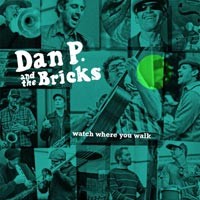
Dan P and the Bricks
Watch Where You Walk (2011)
Skibz777
For some, the name "Dan Potthast" alone will be enough of an incentive to purchase this album. Over almost two decades, the ska-punk stalwart has carved out a niche of his own as a crafter of highly melodic tunes and witty, jovial lyricism which has scored him fans across several bands of several genres. For those yet unconverted, Watch Where You Walk, the debut album from his latest project, Dan P and the Bricks, is as good an introduction as any, finding Potthast digging deeper into his ska roots to produce some of the freshest material of his career thus far.
Despite boasting a 10-man band featuring former members of Slow Gherkin, Watch Where You Walk shares little in common with its manic ska-punk predecessors, clocking in roughly 40 minutes worth of smooth, uptempo ska and reggae, with nary a distorted guitar to be found but equal in energy. The musical textures alternate between quick and bouncy modern third wave to soulful, organ-drenched mid-tempo reggae oftentimes reminiscent of the Slackers, each song characterized by a full (but not overpowering) horn section and Potthast's amiable but confident voice which commands each track. Produced by acoustic ska icon Chris Murray, the album has a warm and organic sound which compliments the music and vibe well, flowing smoothly from start to finish.
Watch Where You Walk is one of the rarest of ska albums these days: a good one. Its songs are lively and energetic without ever falling into the irritating hyperactivity of ska-punk, and the vibe is successfully mellow without ever succumbing to the sunny cliches of contemporary reggae. The music simultaneously pays debt to both traditional ska and third wave while still managing to sound fresh, original and relevant; there's likely enough here to satisfy fans of all sides of the vast ska spectrum. Watch Where You Walk asks only of its listeners to have a good time, and on that it certainly delivers. One of the better ska albums to come out of the States lately, and a prime counterpoint to those who claim the genre had long lost its vitality. Highly recommended.